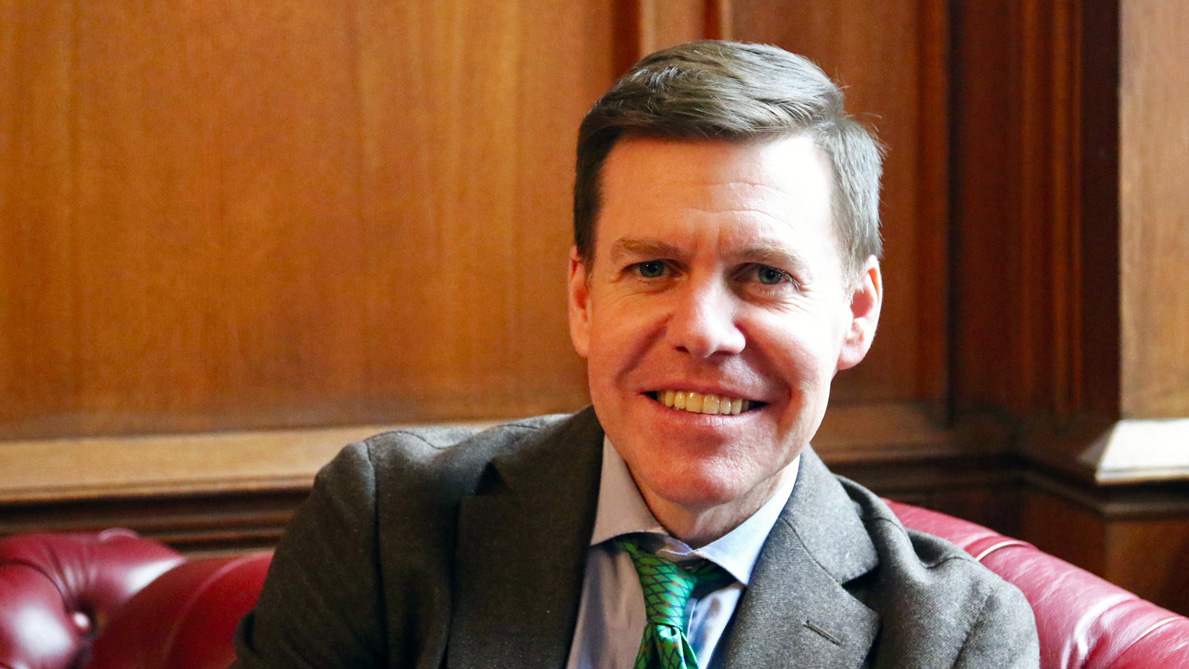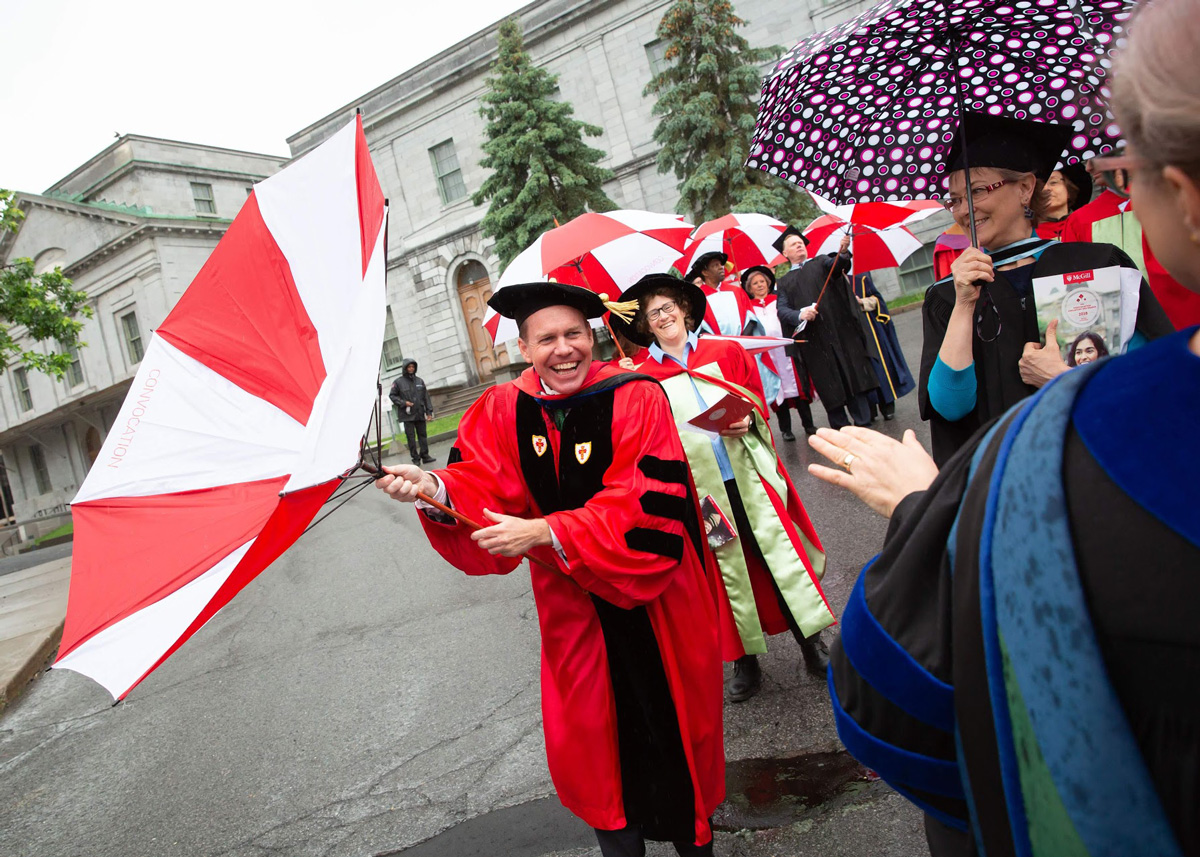
Early in his interview with the McGill Reporter, Garth Green, the inaugural Director of the School of Religious Studies, stops himself in the middle of expounding upon the secularization thesis. “Can you tell I’ve never given an interview before,” he laughs. “I studied 19th-century German theories of knowledge – not the most accessible of topics”!
But Green, the John W. McConnell Professor of Philosophy of Religion, is selling himself short, as he deftly explains Kantian principles in a way that is both interesting and enlightening.
Equally enlightened was the choice to put Green at the helm of the School at a pivotal moment in its history, as it transitions from being the Faculty of Religious Studies to the School of Religious Studies within the Faculty of Arts. With the School nearing the end of the three-year process, Green says the move will enhance “the teaching, degree, and research programs in religion and theology that have characterized [the] long and successful history [of Religious Studies] at McGill.”
Green’s interest in religious studies can be traced to his personal interest in Buddhism that began as an undergraduate student. A six-month stay at the Dalai Lama’s monastery in India led to a research position at the Smithsonian and, eventually, an MA in Tibetan Buddhist philosophy.
“It was toward the end of that first M.A. that I came to realize that I was less interested in the answers that Buddhists gave to certain fundamental questions than I was in the questions themselves,” says Green.
“The 8 a.m. Sanskrit course may have had something to do with that too,” he says with a laugh.
Those fundamental questions have fueled Green’s career-long interest in the histories of Christian theology and European philosophy, and the systematic relationships between these histories.
Tell us about becoming Director of the School of Religious Studies.
I came to McGill from Boston University in 2011, and in 2017 I was awarded the John W. McConnell professorship in philosophy of religion. It was a really wonderful honour because the Chair has a distinguished history and a long-standing commitment to the areas of my research focus.
I was on my first ever sabbatical when the directorship opportunity emerged. So, instead of being on sabbatical this semester, I find myself in this office!”
You became Director officially on February 1, during the three-year transition from Faculty to a School. Where are we in that process?
In the history of McGill, a Faculty has never become a School, so one of the main challenges is that there are no precedents to follow. We are trying to develop protocols at the same time we’re trying to operate by them. Needless to say, it’s been a very busy time [laughing].
Our guiding principle is that everyone should thrive. We have to contribute to the life of the Faculty of Arts, and it should contribute to our own, as positively and dynamically as possible.
The challenges are first procedural – just because we don’t have a template for this. Thus far, however, things have been really encouraging, both administratively and in terms of new academic collaborations. It has been a very fast-paced but very exciting and promising few months.

Can you list some of the positive aspects coming out of this transition?
There really are so many. McGill took this opportunity in order to commit to the enhancement of the capacities of Religious Studies.
The principal advantage is that we are now part of a larger and very dynamic Faculty – a Faculty that we know very well. This means that our long-standing tradition of collaborating with colleagues in anthropology, philosophy, political science, and sociology can be still further developed. Plus, we can embed ourselves and the critical study of religion in the wider life of Arts in ways not possible before.
In fact, we now have the responsibility to do so.
What are some of those historical strengths you mentioned?
The Faculty of Religious Studies was founded in 1948 as McGill’s Faculty of Divinity. It also had partner institutions – the theological colleges that together make up the Montreal School of Theology.
Our principal strength, then, has been in Theology; this emerged from the School’s original six Chairs; Hebrew Bible, New Testament, History of Theology, Church History, Comparative Religion, and Philosophy of Religion. The unit developed areas of strength in the study of Hinduism and Buddhism, and has expanded into the fields of religion and politics, religion and ethics, and sociology of religion.
We also get to build on a number of important recent successes, including the historic gift of the Barbara and Patrick Keenan Chair in Interfaith Studies, which included a number of undergraduate internships and graduate fellowships, and the annual Birks Forum on the World’s Religions and Public Policy. Gratefully, we also retain a dynamic School Advisory Board, chaired by Jonathan Birks.
This means we carry a certain momentum into the Faculty of Arts, and this opens up all sorts of collaborative possibilities – and that’s exciting. Collaboration, clusters, inter-disciplinarity – these are our watchwords.
The School is expanding in some areas, no?
It is. The University’s commitment to enhance our capacity also provides us with funding, and the possibility to envision new priorities and programs.
Part of this enhancement is the deployment of new positions. We are currently debating our areas of priority. It is important that we support and strengthen our areas of historical excellence. But it is also important that we inhabit new territories and develop new strengths. And so, we are committed to doing that and working across Arts and across the University to find partners for that.
Can you tell us about some of the new areas upon which the School will focus?
This past year, we made a joint appointment with Classics in the area of Religion in the Greco-Roman world, and another appointment in South Asian religions. We also hired recently in Japanese Buddhism, and appointed the inaugural Keenan Chair in a completely new area for us – the sociology of Islam.
What areas are you looking to enhance?
We hope next to make a joint appointment with the Department of East Asian Studies in the area of Chinese Buddhism. This position will combine our hope to enhance historical strengths with our hope to occupy new areas of expertise. We have a long-standing tradition of excellence in Indo-Tibetan Buddhism and Japanese Buddhism, but this will provide the historical and conceptual link between those areas of strength, and thus a new impetus for the study of Buddhism at McGill.
We are a relatively small unit – which is a good thing in that we are a close community. When we have a success, say one of our graduate students receives an honour, award, or a placement, we speak about it in the hallways of the Birks Building.
But I think we could do a lot better making ourselves, and our dynamism, known outside the School. We inherit an exceptionally accomplished history; we serve an extraordinarily wide spectrum of undergraduate students in our courses and programs; we have an extraordinarily large, successful, and dynamic graduate program. One of my goals is simply to tell our story more widely and effectively.
Why are religious studies so important?
There is no time in human history in which the study of religion is unimportant. In no recorded era of human history and in no culture is religion absent.
You may know of the “secularization thesis.” It is one of the founding moments of the modern study of religion. People like Marx, Weber and Durkheim all imagined in their own ways that with increased rationalization and increased technological progress religions would disappear. But that does not seem at all to be the case. Given the demise of this secularization thesis, and given the importance of work done in its wake here at McGill, most importantly by Charles Taylor, it’s not only the religions themselves that are important to understand, but also the frames in and with which we study them.
When did you develop your interest in religion and religious studies?
I have to admit that originally I was not particularly interested in either! As an undergraduate philosophy student, I became interested in Buddhism, and specifically Buddhist theories of selfhood. I spent six months at the Dalai Lama’s monastery in India, which led to a research stay at the Smithsonian and then an MA degree in Tibetan Buddhist philosophy.
How did you move from Buddhist philosophy to your current research interest?
I started studying the history of European philosophy in so far as it was thought to be close to Buddhism. People like Hume and Schopenhauer and Wittgenstein – philosophers whose views were quasi-Buddhistic in certain respects.
I soon realized that it really was not the degree to which their answers were congruent with Buddhism, but the integrity of their positions, and even the questions themselves, that interested me. That led me to begin studying the history of European philosophy.
What are some of those questions that drive your inquiries?
Kant put forth the fundamental questions that interest me as: What can I know? What should I hope for? What ought I do? He later added a fourth – what is man? Or as McGill’s own Charles Taylor put it, similarly: What is it, and what does it mean, to be a human person?
Have you come closer to answering any of these questions?
When you are young, you really feel the force of the question. As I grow older, I have become interested in – and this may seem arcane – the assumptions and implications of particular answers, in their economy.
What do you mean by that?
I study mediaeval theology and the 19th-century philosophical critique of that, specifically Kant’s. He argued that modernity is a critical and thus secular age. Before Kant’s Critique of Pure Reason, theology was understood to be the queen of the sciences; after that work, it was widely understood as not ‘scientific’ in the relevant sense at all. It is difficult to overstate the importance of this shift.
Kant’s arguments have themselves been criticized, of course, and styles of thought and claims made in mediaeval theology have been recapitulated by post-Kantian philosophers of religion, most forcefully in contemporary French philosophy. So, I’m really interested in the theme of ‘tradition’ – how we inherit such histories, and what it means that theological forms of self-understanding are rediscovered in contemporary philosophical contexts.
Most generally, I’m interested in the binaries between mediaeval and modern, between sacred and secular, or sacred and profane, and between philosophy and theology, knowledge and faith, reason and revelation. I’m interested in how we draw these distinctions, and in thinking through the possible relations between these terms. These things mean different things in different eras. What faith means in the 3rd-century Alexandria is different than what it means in 13th-century Paris or 19th-century Berlin or Montreal today.
These decisions about the relationships between sacred and secular are always with us; we cannot not make them; we cannot but then live out those decisions. I think it is important to understand why we feel intuitively compelled to make certain commitments. I also feel that it is important to examine, and perhaps even transform those intuitions – regardless of which direction those transformations take us.
To a certain degree, this is what the School of Religious Studies itself is doing currently, as we consider its novel possible forms!

As an alumnus who minored in Sanskrit (BA ’03), I had to laugh in joyful reminiscence and heartfelt commiseration at the reference to the 8am Sanskrit course. Ninth-century Buddhist commentaries on fifth-century Buddhist texts at that hour of the morning – the things of student days!